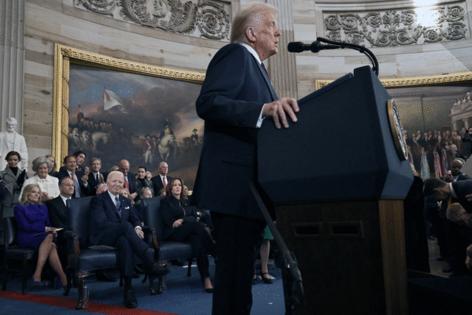Trump pledges EV policy rollback, thanks auto workers in inauguration speech
Published in Business News
President Donald Trump pledged in his inauguration speech to swiftly roll back what he has labeled the "electric vehicle mandate," or federal regulations that would've required increasingly strict vehicle emissions standards over the coming years.
Trump claimed the coming executive order — expected to be signed later Monday as part of a larger suite of actions around energy policy — would "save" the U.S. auto industry and its workers. And for consumers, he added, "you'll be able to buy the car of your choice." Such a regulatory rollback could mean automakers place less of a focus on producing EVs going forward.
The Environmental Protection Agency in March finalized a greenhouse-gas emissions tailpipe fleet standard for model years 2027 to 2032. Contrary to Trump's statements, those final rules don't require customers to buy an EV, but are a performance standard that allows automakers to determine their sales mix to comply with the limits.
The agency projected by 2032 manufacturers may choose to produce all-electric vehicles for about 30% to 56% of their new light-duty vehicle sales along with a mix of other hybrid, plug-in hybrid and cleaner gas- and diesel-powered vehicles. The Biden administration had said the goal was to encourage Americans to buy EVs, and auto companies to start the shift away from gas-powered vehicles, in a bid to cut greenhouse gases and address climate change. The policy was also expected to improve public health, the EPA said, by reducing fine particulate matter and ozone and preventing premature deaths and other health conditions.
Trump in his speech at the U.S. Capitol also pledged that in his second term the American auto industry — and manufacturing in general — would expand again and produce a historic level of vehicles: "Thank you to the auto workers of our nation for your inspiring vote of confidence. We did tremendously with their vote."
Trump also promised in his first days in office he would move toward overhauling the country's trade system, including by increasing tariffs — another move that could have major implications for the auto industry. The president previously during the campaign said he wanted to hike tariffs on goods coming from China, Mexico and Canada.
"We are establishing the External Revenue Service to collect all tariffs, duties and revenues," he said. "It will be massive amounts of money pouring into our treasury, coming from foreign sources."
The Wall Street Journal reported that Trump will hold off on new tariffs initially, however, instead opting to sign a memorandum that would tell federal agencies to study trade issues.
Auto companies have been scenario-planning and waiting to see which EV, manufacturing and trade policies the new president aims to tackle first.
In a post made on the social media platform X, General Motors Co. CEO Mary Barra congratulated Trump and Vice President J.D. Vance, writing: "GM looks forward to working together on our shared goal of a strong U.S. automotive industry."
John Bozzella, CEO of the Alliance for Automotive Innovation, the major lobbying group for the U.S. auto industry except Tesla Inc., last week said he expected EPA regulations to be among the first priorities of the new administration.
The group in recent weeks has emphasized that although national standards deserve another look as EV adoption hasn't increased as quickly as previously expected, limits put in place by California and adopted by 11 other states and Washington, D.C., are "unachievable." Under Trump's first term, his administration challenged California's authority to set its own standards.
"We can't have regulations that push the industry too far ahead of the customer," Bozzella said last week at the Detroit Auto Show. "The customer is in charge, and so having a little bit more balance between our regulatory objectives — whether they're about emissions or fuel economy technology — with where the customer is going to be really important."
The United Auto Workers worked to defeat Trump. But many of the union's members nevertheless backed him, and Trump made his appreciation clear in the inauguration speech and a later Monday address.
“The unions came through,” Trump said in remarks to an overflow room in Emancipation Hall after his inaugural address. He noted his support in the 2024 campaign from union members came amid opposition from some union leaders, an apparent reference to United Auto Workers President Shawn Fain.
“Look what we did with the auto workers in Michigan,” Trump said. “Look what we did with the Teamsters.”
Fain wrote in an editorial in The Washington Post on Sunday that union officials were ready to work with the new president on trade policy that would keep more blue-collar jobs in the United States.
"We do not agree with Trump on much of his domestic agenda, but we hope to find common ground on overhauling our devastating trade policies and rebuilding U.S. manufacturing," Fain wrote. "Trump has promised to enact tariffs to protect workers, and we agree that tariffs are a necessary tool."
©2025 www.detroitnews.com. Visit at detroitnews.com. Distributed by Tribune Content Agency, LLC.












Comments